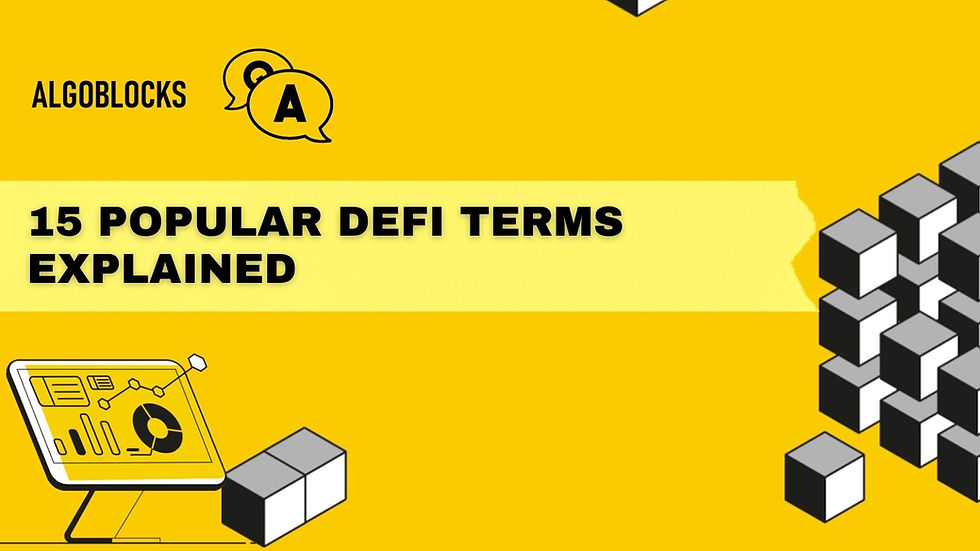
The recent popularity of Decentralized finance has led to an increase in demand for knowledge about it. This article provides 15 useful terms that will help you in that journey.
1. Smart contracts
These are programmed contracts that execute on their own when conditions are met for a transaction. A smart contract contains encrypted data and is impossible to lose or alter the data it stores on the blockchain. They are not legally binding contracts.
2. Liquidity pool
Liquidity in finance means the availability of funds that are ready for any transaction. A liquidity pool is a collection of funds from liquidity providers or investors. These funds are stored in a smart contract and will be used to execute trades and other financial services.
3. Decentralized Exchange (DEX)
A DEx is a peer-to-peer trading platform, which differentiates itself from a Centralized Exchange (CEx). The transactions are executed via automated smart contracts. It is said to be cheaper to transact on it than on a centralized exchange and provides anonymity because it doesn’t require identity verification.
4. Stablecoins
Stablecoins are cryptocurrencies that are pegged to a currency like the US Dollar. It is favored in crypto because of its stable value (e.g 1 USDT = 1 USD) versus other highly volatile altcoins. Examples of stablecoins are Tether (USDT), USD Coin (USDC), and Binance Coin (BUSD).
5. DeFi Aggregator
A DeFi aggregator is a platform that compiles various products from DeFi platforms in one location to allow its users to choose the best for their specific needs. It encourages convenience, diversification of investments, and getting the best rates with the ability to compare trades from across multiple protocols.
6. Decentralized Autonomous Organization (DAO)
DAOs are built by developers to perform automated decision-making and get rid of human errors. They are made up of members who hold tokens that serve as voting rights. They are collectively owned by these members and are not held by a single point of authority.
7. Decentralized apps (dApps)
These are open-source applications that perform processes on a peer-to-peer model or run on a blockchain network. These apps are known to offer anonymity to their users and can execute smart contracts without an intermediary.
8. Automated Market Maker (AMM)
An AMM is a protocol for decentralized exchanges that allow transactions to take place with autonomy. They serve the place of traditional order matching systems and order books. Uniswap is an example of an AMM protocol.
9. Impermanent Loss
This is a situation in which the value of what you deposited in a liquidity pool is lower at the time of withdrawal. It is one of the risks in providing liquidity in liquidity pools.
10. Liquidity Mining
Liquidity mining or yield farming is an activity in which investors (called liquidity providers) supply cryptocurrencies as liquidity to decentralized exchanges. In return, the providers are rewarded with interest.
11. Annual Percentage Yield (APY)
APY is the annualized interest rate of return on your investment. It is typically higher compared to those offered by traditional financial institutions.
12. Flash loan
A flash loan is a loan that doesn’t require collateral but requires the loan to be paid back within the same transaction. This is an innovation only offered in decentralized finance as the loan is powered by smart contracts.
13. Gas fees
Gas fees are what you call the payment required to process transactions. It is more or less a transaction fee to validate and process transactions on the blockchain.
14. Trustless
This is usually an adjective describing blockchain projects that minimizes the need for trust for transactions to occur, enabling strangers to engage in transactions without a central authority. Blockchain incentivizes good actors (e.g. validators) in a protocol, which improves its trustless characteristic.
15. Permissionless
Blockchains are permissionless in such a way that anybody can be part of it and contribute to its growth and maintenance. Bitcoin and Ethereum are two well-known permissionless and public blockchains.
About AlgoBlocks
📹 Demo Video: https://www.youtube.com/watch?v=D3ZnUAqFdWg 🌎 Website: www.algoblocks.io 📌 Twitter: https://twitter.com/Algoblockstrade 📎 Whitepaper: https://algoblocks.gitbook.io/algoblocks/ 🎮 Discord: https://discord.com/invite/vbtrYAd4ma 👥 Telegram Group: https://t.me/algoblockss 🗣 Telegram Channel: https://t.me/algoblocks ✍🏻 Medium: https://medium.com/@algoblocks 💼 LinkedIn: https://www.linkedin.com/company/algoblockstrade/
Comments